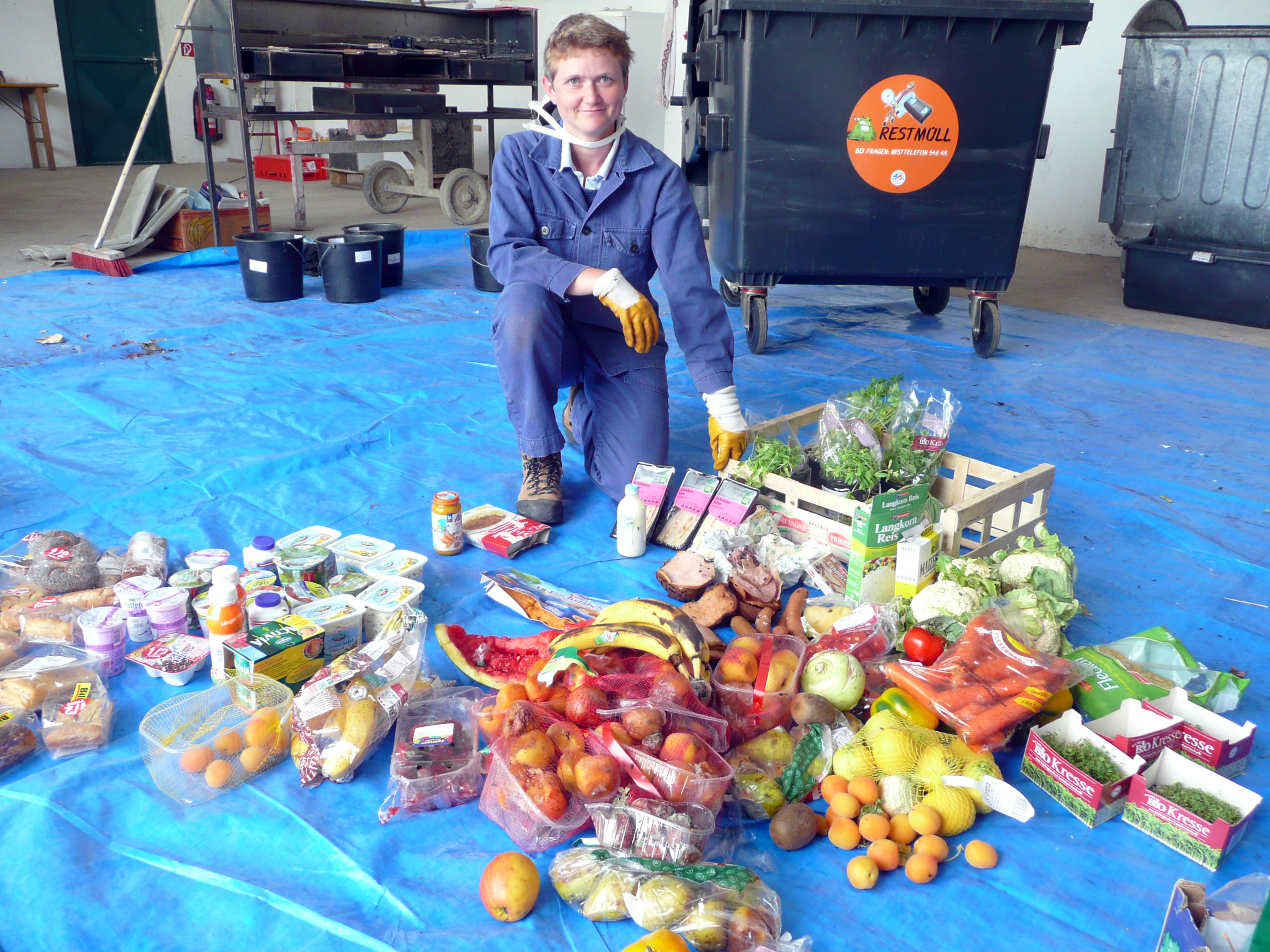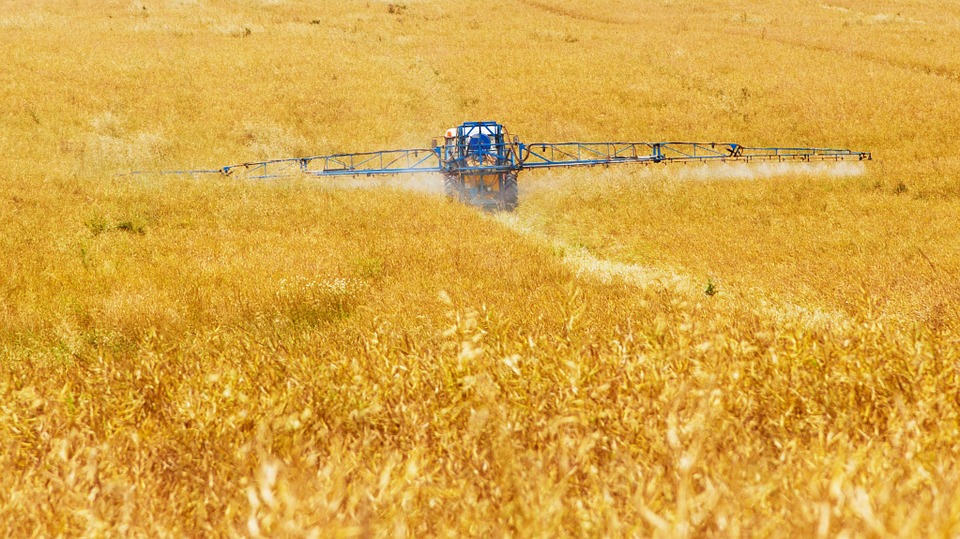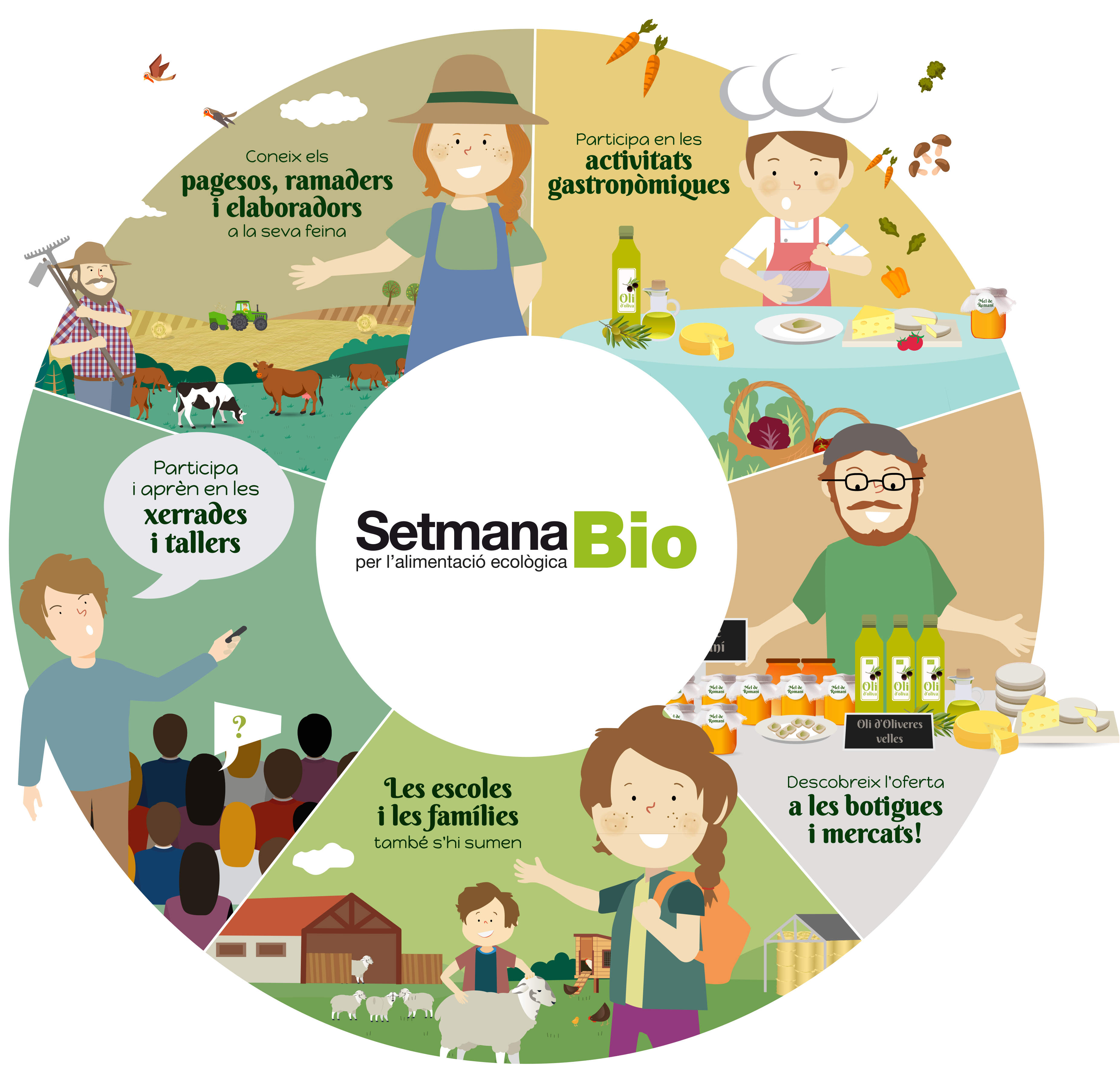In this programme you will find practical ways for moving towards a diet that includes habits which improve quality of life for ourselves and the people around us.
You learn how this affects our decisions, how we choose what we buy and where we buy it, all in a cheerful, fun and creative way.
We discover how to improve our surroundings and our inner selves, in order to feel full of life.
Our food choices have an impact on the environment; we review various diets (carnivorous, omnivorous and vegetarian) and finally focus on the plant-based diet.
Sustainable Food Citizen Week
Video resum de la Setmana Ciutadana de l'Alimentació Sostenible 2021
The activities of the Sustainable Food Citizen Week
Sustainable Food Citizen Week provides an opportunity to understand the relationship between food habits and cross-cutting aspects such as the climate emergency, local economic development, culture, politics, social rights and health. A week dedicated to citizens, in which you will achieve knowledge, reflection and debate about the main issues of the following activities.
Gastronomic heritage
- October 18th - 18.00 HBetevé broadcastingTelevised cooking workshop
- October 19th - 18.00 HBetevé broadcastingTelevised cooking workshop
How can you adapt sustainable food to healthy living?
Batch cooking consists in cooking for the whole family and investing a little time so you can make nutritious everyday meals, at home and for your lunch box.
BREAKFAST: habits as simple as a good glass of water, with sea water and lemon. Breakfasts such as shakes or smoothies, which you can warm up in winter. You will discover recipes such as rice pudding and pear, quality-bread sandwiches and an omelette made from organic eggs.
LUNCH: important notions on how to structure a dish with different groups of foods. A dish is not the same for a teenager as a middle-aged person. You can cook the same for all the family but put in what each person needs. You should always add vegetables in season, wholemeal carbohydrates, some raw vegetables, sprouted and fermented foods, etc. You will discover recipes such as baked pumpkin with curry; lentils cooked with adobo, sprouted ... and seeds; chickpeas with prawns; wholemeal rice with mushrooms; and lettuce head salad with carrot, olives and chopped chives. Wholemeal pasta with courgettes, mushrooms, squid with carrot and beetroot.
EVENING MEAL: an evening meal or supper should be light and eaten as early as possible. You will discover recipes such as pumpkin, sweet potato and oatmeal soup; vegetable pudding with carrot and broccoli; fish soup with noodles, and grilled fish in a sauce.
- October 20th - 18.00 HBetevé broadcastingTelevised cooking workshop
Getting children away from processed food as much as possible.
At home, we can organise menus very quickly, using fresh and seasonal local produce.
Not forgetting breakfasts and snacks and their natural desire for sweet food; we offer some great solutions.
Waste vs Good use
- October 16th - 20.00 HPlaça ReialTalk
Presentation of Repensa el que menges (Rethink What You Eat), a guide for the sustainability of formal and non-formal educational practices in the promotion of the right to food through the service learning methodology.
- October 16th - 20.00 HTeatre del CCCB, Jardí dels Tarongers, Plaça del Rei, Parc de la BarcelonetaShow
A unique musical group, the Vegetable Orchestra, plays instruments made from fresh vegetables. The use of various vegetable instruments makes for a unique musical and aesthetic universe. The Vegetable Orchestra covers the most diverse musical styles, combining genres from electronic music to jazz. The newly created instruments determine the resulting sound. A Vegetable Orchestra concert appeals to all five senses.
- October 20th - 22.00 H (variable according to betevé programming)Betevé broadcastingDocumentary film season
Amazing, but true: from the farm to the dining table, more than half of the food is thrown away and much of that food never reaches consumers. Why are these increasingly large amounts of food being destroyed? In this documentary we will look for explanations for this waste.
This activity is part of the Betevé documentary film series that includes the films Fermentación espontánea, Taste the waste, Food for change and Il mare piange.
Urban rurality and biodiversity
- October 16th - 10.00 HJardí dels TarongersWorkshop
What needs to be taken into account when creating and managing your own seed bank at home or in an allotment. How to carry out the natural selection of seeds, how to conserve them and manage them.
Creating a seed bank is an initiative that reinforces food sovereignty. Recovering seeds is an act of empowerment, in order to stop depending on agro-industrial lobbies.
A seed bank helps to recover traditional seeds and increase the biodiversity which is being lost year after year. This is an educational activity to highlight the great work being done by farmers and how this contributes to a healthy, sustainable diet in our homes. - October 16 at 14:30hJardí dels TarongersCulinary experience
A guided meal to discover how cooking based on local produce and edible wild plants is good, fun and also essential. We explain the story behind each of these dishes, how they were made, the characteristics of their ingredients, how the species used were traditionally employed, and their potential in the kitchen (and the countryside) today.
The wild plants are the stars of each dish. We begin by explaining the plants hidden in the wild-plant salad with pine syrup, followed by a tasting session of savoury coca cakes using vegetables of traditional agricultural varieties (pumpkins, spinach, onions, etc.), wild plants (purslane, white goosefoot, sow thistles, etc.) and locally-produced cheese. We will end with a tasting session of sweet coca cakes (carob brownie with wood calamint, almond cake with satureja and apple crumble with lemon verbena), accompanied by a home-made ratafia wine or elder and blackberry syrup for the younger participants.
The meal is suitable for vegetarians.
We hereby inform you that we cannot guarantee that the meals served during this event are free of substances that may cause some type of allergy or food intolerance.
- October 17th - 17.00 HParc de la BarcelonetaShow
Transhumance is the seasonal migration of herds in search of pasture land wherever it may be depending on the time of year: pasture land in the mountains in summer and on the plain in winter.
And so are our shepherds, they lead the flock where the public is gathered to enjoy the street theatre. Shepherds, goats and our dog are the main characters. But maybe you will also end up being a protagonist. Do you know how to milk? And how do you do as a wolf?
Ecological footprint
- October 17th - 13.00 HPlaça del ReiTalk
Talk looking at all the most common stages of the life cycle of our food. From the farm to the table, we’ll be pondering the carbon footprint of agriculture, packaging, logistics, cooking, organic waste etc. The overall goal is to provide information for deciding on food which has a lower impact in terms of greenhouse gas emissions. The session will also stress the contradictions in environmental communication for consumers.
- 17th October 13.30 hPlaça del ReiTalk
What are the impacts of our food system on our planet? How does this affect the peasantry, our territory and the communities of the global south? What role does the food industry play? What can we do as consumers? What is the role and situation of women, who have traditionally fed the world? On all these issues, we offer you an exciting dialogue with Vandana Shiva (Indian climate activist, graduate in physics, philosopher, ecologist, feminist and author of more than twenty books and 300 articles in the world's most prestigious scientific journals) and Esther Vivas ( activist, researcher in social movements and agricultural and food policies, degree in journalism and diploma in higher studies in sociology from the Autonomous University of Barcelona).
- October 17th - 17.30 HPlaça del ReiRound table
The current industrial agri-food system generates a series of environmental conflicts that are manifested through struggles and mobilisations in response to the impact this system has on the environment and society. These conflicts are mainly associated with the defence of environmental conditions or equal access and distribution of natural resources, often occurring in production and transit areas, and ultimately affecting the regions and communities where they happen. They often reveal conflicting interests, different development paradigms, and aspects related to involvement in decision-making.
The aim of this roundtable is to address some of the main current socio-environmental conflicts in Catalonia, arising from the food system, and to understand the causes and impacts both in Catalonia and the Global South, in order to make them visible, encourage dialogue and provide possible solutions or alternatives.
Proximity
- October 17th - 11.30 HParc de la BarcelonetaTalk
Explanation of the Baix Llobregat Agricultural Park as a metropolitan agricultural area that produces food locally for the Barcelona Metropolitan Area. A public-private entity that aims to preserve the farmland and encourage the development of a professional agriculture that ensures the supply of fruits and vegetables to local markets and the viability of farms. During the talk we will discuss projects like the Parc Agrari farmers markets, the Producte Fresc del Parc Agrari brand, and the creation of a “test” area to encourage young people to get involved in farming.
- October 17th - 12.00 HParc de la BarcelonetaTalk
Ramats de Foc is a prescribed-silvopasture project aimed at boosting the contribution of livestock in fire-risk management through pasture in strategic forest areas.
Prescribed silvopasture is the practice of extensive livestock feeding following established a priori guidelines and goals to achieve a type of fire-resistant forest mass and Ramats de Foc is an initiative to promote this work, and help to extend it through our forests and bring it added value.
The project also aims to promote continuity of livestock activity in the region, through its twofold food and landscaping work, and to strengthen the ties between shepherds and local butchers.
By promoting the consumption of livestock animals that manage our forests, the aim is to encourage a change of perception in society so people understand how a certain kind of regional management will enable protection against the big fires that cause the most damage and that initiatives as simple as consuming local livestock are already helping to maintain fire-adapted landscapes.
- October 17th - 12.30 HParc de la BarcelonetaTalk
Alternatives from the global south to the impact of our unsustainable food system: the case of the Mercado Central del AMBA (Buenos Aires metropolitan area).
The activity, which is aimed at all members of the public, is part of the agreement for implementing the “Barcelona menja bé i just” project.
More week
- October 16-22VideoconferenceOnline
In this theoretical-practical online course you will learn about the tools you need for a healthier, more balanced diet, learning to choose seasonal ingredients and use them in simple, quick and tasty recipes. We will explain how you can organise and design your weekly menu so that it is more varied and sustainable. We will help you to consume in a more conscious way, avoiding food waste and unnecessary packaging. You will prepare simple, tasty vegetarian recipes, in order to include more fresh, seasonal vegetables in your diet. A dietician will always be on hand to answer any queries, and you can share your experience with other participants to ensure that the session is more fun and worthwhile.
You will receive information and a recipe every day, by email. Throughout the course, there will be a WhatsApp group for comments and queries.
Activity with admission price (€15). - October 16-22, all dayVideoconferenceOnline
Do you know everything you can do to avoid food waste?
From 16 to 22 October, put yourself to the test! Participation through Nutrició Sense Fronteres Instagram - October 16-24 - Every day at 9.00 HFace to face and onlineWorkshop
Bio Week for Organic Food is an event featuring a whole host of activities around Catalonia, with the common goal of promoting and introducing organic produce and food to the public. The activities are organised by producers, processors and transformers, associations, shops, restaurants and schools working on subjects relating to organic agri-food production. See all the activities on the www.setmanabio.cat.






















